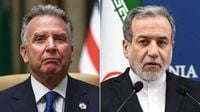The United States and Iran have embarked on a pivotal third round of nuclear negotiations, entering a more intricate phase of discussions this weekend. The talks, taking place on April 26-27, 2025, are crucial as both nations attempt to navigate their stark differences regarding Iran's nuclear program and its right to enrich uranium.
U.S. Secretary of State Marco Rubio emphasized on April 23 that the U.S. does not envision Iran enriching its nuclear material but rather insists on the importation of nuclear fuel for a civilian energy program. "There’s a pathway to a civil, peaceful nuclear program if they want one," Rubio stated, reiterating that if Iran insists on domestic enrichment, it would raise significant concerns.
These negotiations come in the wake of heightened tensions, with President Donald Trump previously threatening military action against Iranian nuclear sites should Tehran reject a deal. The backdrop of these discussions is a complicated history; a nuclear deal was initially struck in 2015 between Iran and world powers, including the U.S., under the Joint Comprehensive Plan of Action (JCPOA). This agreement permitted Iran to enrich uranium at levels suitable for a peaceful nuclear program, but Trump withdrew from the deal in 2018, leading Iran to escalate its uranium enrichment to 60% purity, dangerously close to weapons-grade levels.
In March 2025, Trump sent a letter to Iran’s Supreme Leader Ayatollah Ali Khamenei, proposing negotiations for a new nuclear deal with a two-month deadline for acceptance. This shift in approach reflects a desire for a stronger agreement than the one established during the Obama administration. However, the specifics of what the U.S. is demanding remain unclear; officials have fluctuated between calls for a complete dismantlement of Iran’s nuclear program and allowing a civilian energy program contingent on halting domestic enrichment.
Steve Witkoff, Trump's envoy to the Iran talks, has expressed that Iran does not need to enrich uranium beyond what is necessary for nuclear energy. Yet, he later stated that any final agreement would require Iran to eliminate its nuclear enrichment and weaponization capabilities. Meanwhile, U.S. Defense Secretary Pete Hegseth has called for the complete dismantling of Iran's nuclear program.
Iran, for its part, has remained steadfast in its insistence that its right to enrich uranium is non-negotiable. Foreign Minister Abbas Araghchi articulated this stance, stating, "Iran’s enrichment program is a real and genuine matter, and we are ready to build trust regarding potential concerns, but the issue of enrichment is non-negotiable." Iran's leadership has approached the talks with caution, and Araghchi has hinted at the potential for U.S. companies to participate in Iran's nuclear energy sector, suggesting that this could lead to tens of billions of dollars in contracts.
As the talks progressed, technical teams began to delve into the specifics of a potential agreement. Michael Anton, head of the State Department’s policy planning, led the U.S. expert delegation, which included about a dozen working-level experts. The discussions, mediated by Oman, reportedly lasted over seven hours and focused on mutual demands and expectations.
Oman's Foreign Minister Badr Albusaidi indicated that a fourth round of talks is expected to take place on May 3, 2025. The atmosphere during the discussions was described as serious, with Iranian officials confirming that the focus was strictly on sanctions and nuclear questions, explicitly excluding discussions about Iran's defense and missile capabilities.
In the lead-up to the talks, a significant explosion at Iran's Shahid Rajaee port injured hundreds and resulted in fatalities, drawing attention to the volatile situation in the region. This incident occurred alongside Trump's reiteration of his military threats should negotiations fail, indicating the high stakes involved.
Despite the challenges, Araghchi expressed cautious optimism, stating, "If the sole demand by the U.S. is for Iran to not possess nuclear weapons, this demand is achievable." However, he cautioned that unrealistic demands could derail the negotiations.
Complications may arise if the U.S. insists on conditions that require Iran's nuclear program to be dismantled entirely, akin to the Libya model, which Iran has long rejected. Additionally, the U.S. has called for restrictions on Iran's nuclear activities to be indefinite, a point that could prove contentious given the 2015 deal's expiration date in October 2025.
Israel has been vocal in its opposition to any deal that does not involve the complete dismantling of Iran's nuclear capabilities. Reports suggest that Trump has discouraged Israeli military action against Iran while negotiations are ongoing, a move that may not sit well with Israeli leadership.
The discussions between the U.S. and Iran are not only about nuclear capabilities but also involve broader regional security concerns. Iran's ballistic missile program and its influence in the Middle East are critical points of contention, particularly for U.S. allies in the region.
As the negotiations continue, the international community watches closely. The outcome could significantly impact regional stability and the global approach to nuclear non-proliferation. With both sides entrenched in their positions, the path forward remains fraught with challenges.
In summary, the ongoing nuclear talks between the U.S. and Iran represent a crucial juncture in international diplomacy. As both nations grapple with their respective demands and concerns, the potential for a new agreement hangs in the balance, with significant implications for global security.




